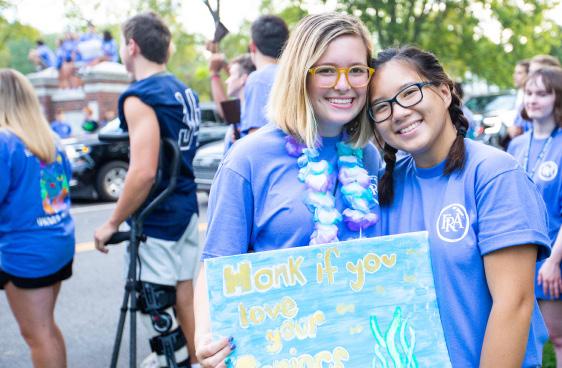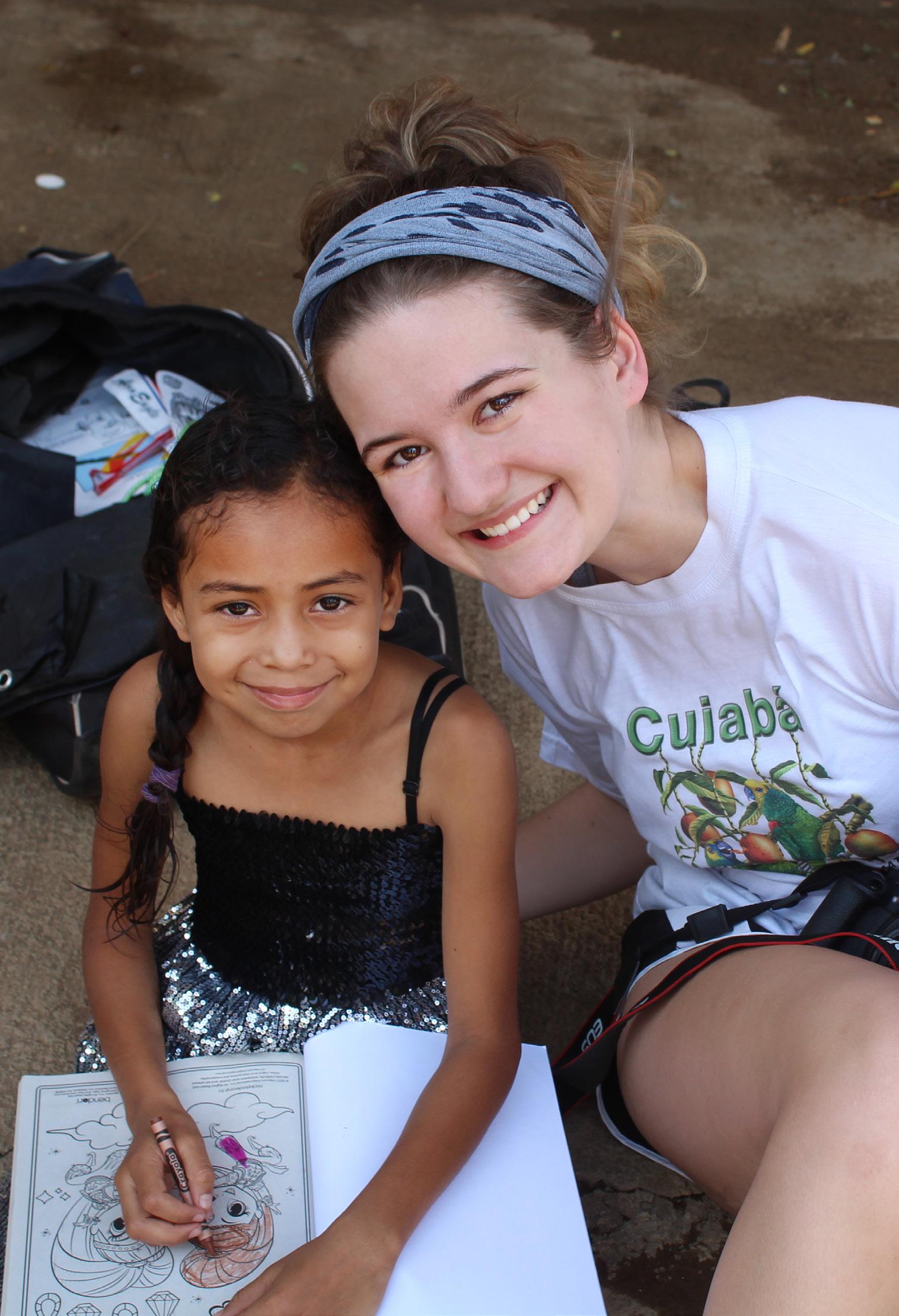
6 minute read
Academic Electives
to solve problems. The course focuses on learning to create computational artifacts. Students enrolled in the course learn the role and impact of technology and programming in society. Students also develop an appreciation of programming and technology as a way to personally create significant artifacts and an understanding of programming and technology as a way to create solutions to computational problems.
BROADCAST JOURNALISM
½ Credit
Broadcast Journalism is an introductory course designed to acquaint students with the fundamentals of broadcast production through a theory-based, hands-on approach, which includes writing, producing, utilizing on-air camera techniques, and editing. Students will receive basic training in videography techniques using digital technology to create various broadcasts for TV and the Internet (Podcasts). The class will focus on writing and reporting well-balanced, comprehensive, and visually compelling stories. Students will research, report, write, shoot, and edit stories. In addition, students will explore the history of radio and television and examine the responsibilities and ethics of broadcast journalists.
BROADCAST JOURNALISM II
½ Credit
Broadcast Journalism II is a semester-long academic elective for students in grades 9-12. This is an advanced level course designed to challenge students already equipped with the fundamentals of broadcast journalism. Students enrolled in this course will apply and use their journalistic skills for a variety of purposes. This course will have two objectives. The first is to develop the skills necessary to run a news broadcast, including interviewing, videography, and photography. The second is utilizing editing software to create creative videos with a variety of topics, including a PSA and short films. Students will have the opportunity to present their work to the student body and compete in national competitions. Broadcast Journalism I is a prerequisite for this course.
Academic electives offered at FRA cover a variety of topics and life skills. These courses do not fulfill departmental requirements, but count as academic courses toward a student’s required 20 academic credits. Many of these courses include professional speakers and enrichment opportunities outside the classroom.
COURSE OPTIONS:
Public Speaking* (9–12) Sports Business* (11 & 12) Criminology* (11-12) AP Capstone: Seminar (11-12) AP Capstone: Research (12) Philanthropy 101: FRA Civic Design Lab (summer only) Exceptional Learners & Psychoeducational Studies Business Communications
*One-semester course
PUBLIC SPEAKING
½ Credit
This course teaches the use of verbal and nonverbal communication to organize and deliver effective oral presentations. Emphasis is on research, preparation, delivery, and evaluation of informative, persuasive, and formal event speaking. Upon completion, students will be able to prepare and deliver well-organized speeches and participate in group discussion with appropriate audiovisual support. Students will also demonstrate the speaking, listening, and interpersonal skills necessary to be effective communicators in academic settings and in the community.
SPORTS BUSINESS (Not offered in 2021-22) ½ Credit // Grades 11-12
This course is designed to introduce students to the business of sports and its $70-billion industry. Topics include the history and growth of sports in America, understanding revenue streams, the importance of external communication (marketing, social media, public relations), local case studies in Nashville, and examining career opportunities in the field. This course will include a mixture of lectures, group projects, case studies, and guest speakers. Specifically, the projects and case studies will focus on conflict resolution, negotiation, interpersonal communication, and public speaking. By utilizing the professional and collegiate teams in the area, students will have the ability to hear from, and ultimately present solutions to, local leaders in sports business.
CRIMINOLOGY
½ Credit // Grades 11-12
This course is designed to give students an in-depth look into the criminal justice system, including a history of early police techniques developed by Sir Robert Peel and modern police techniques, such as the latest technology employed by police departments. Students will be challenged to examine the current legal system and how court decisions have impacted and changed police procedures. Specific areas of interest will include DNA and fingerprint analysis and crime scene investigations. The course will conclude with a mock trial.
AP CAPSTONE: SEMINAR 1 Credit // Grade 11-12
The AP Seminar course equips students with the power to explore academic and real-world issues from multiple perspectives. Through a variety of materials – from articles and research studies to foundational and philosophical texts – students will be challenged to explore complex questions; understand and evaluate opposing viewpoints; interpret and synthesize information; and develop, communicate, and defend evidence-based arguments. Samples of course themes that may be covered in AP Seminar include education, innovation, sustainability, and technology. Students are assessed through both an individual project and a team project completed during the year and a year-end written exam. AP Seminar is open to recommended juniors, and it is particularly encouraged for students simultaneously enrolled in AP English Language & Composition; however, seniors may take AP Seminar as well. Students must be recommended for AP Seminar based upon strong grades in English and Social Science courses along with motivation and a strong work ethic.
AP CAPSTONE: RESEARCH
1 Credit // Grade 12
AP Research allows students to deeply explore an academic topic, problem, or issue of individual interest. Through this exploration, students design, plan, and conduct a year-long investigation to address a research question. In the AP Research course, students further develop the skills acquired in the AP Seminar course by learning research methodology, employing ethical research practices, and accessing, analyzing, and synthesizing information. Students reflect on their skill development, document their processes, and curate the artifacts of their scholarly work through a process and reflection portfolio. The course culminates in an academic paper of 4,000-5,000 words (accompanied by a performance, exhibit, or product where applicable) and a presentation with an oral defense. AP Seminar is a prerequisite for this course and students must be recommended by the AP Seminar teacher.
PHILANTHROPY 101: FRA CIVIC DESIGN LAB
½ Credit (offered only in summer)
This course provides a 3 week, 15 lesson, systematic study of the world of philanthropy and social enterprise. This elective is an opportunity to learn about philanthropy and non-profit organizations in Nashville, using our own city as a lab. Students will do philanthropy, too. Outside of the time constraints of a school year schedule this experiential, hands-on course allows students and teachers to be off campus 50% of the time observing first-hand, touring, interviewing and serving. Students will use the knowledge they acquire throughout the three week course and connect it to a social issue of interest. Students receive ten service hours for the hours they spend at their assigned non-profit.
EXCEPTIONAL LEARNERS & PSYCHOEDUCATIONAL STUDIES
1/2 Credit // Grade 11-12, Application Required
This elective course introduces students to exceptional education and the differences in learning among individuals. Students will explore learning exceptionalities, differences, and deficits that individuals may experience and strategies for teaching and learning through these exceptionalities. Students will learn terminology, identification, and issues commonly encountered when addressing the needs of diverse students with disabilities. Emphasis will be placed on psychoeducational process, inclusion, diversity issues, federal and state law, individualized education programs, and professional practices and foundations in special education. The course addresses the collaborative roles of a multidisciplinary approach to supporting children and youth with disabilities in a diverse society. Students will split their time between receiving direct instruction from the course instructor and applying knowledge in mentor role in a supervised classroom setting. Students will attend a prep workshop prior to school beginning in order to begin their mentor role when classes begin.
BUSINESS COMMUNICATION
1/2 Credit // Grades 11-12
Students in the Business communication course will become familiar with important industry terminology, learn to define and refine KPIs, analyze necessary business needs, select appropriate analytics platforms, and use data to solve problems. Using case studies, data simulations, and examples from for-profit and non-profit organizations, students will learn how analytics can be used to optimize business and specific areas of marketing. Areas covered will include: consumer behavior prediction, advertising, search engine optimization, formal and informal business writing, and social media/electronic marketing platform campaign monitoring. Guest speakers and industry leaders will be brought in regularly for lectures and student project/case study consultations.
This project-based class will culminate with developing a marketing analytics strategy that is applicable to a real business problem or meets an organization's ongoing need to leverage data and reach consumers. Students will also have the opportunity to perfect their own personal branding documents, including resumes, personal statements, and cover letters.







